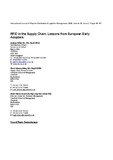- CERES Home
- →
- School of Management (SoM)
- →
- Staff publications (SoM)
- →
- View Item
JavaScript is disabled for your browser. Some features of this site may not work without it.
| dc.contributor.author | White, Andrew | - |
| dc.contributor.author | Johnson, Mark | - |
| dc.contributor.author | Wilson, Hugh | - |
| dc.date.accessioned | 2011-09-08T10:12:40Z | |
| dc.date.available | 2011-09-08T10:12:40Z | |
| dc.date.issued | 2008-02-01T00:00:00Z | - |
| dc.identifier.citation | Andrew White, Mark Johnson and Hugh Wilson, RFID in the supply chain: lessons from European early adopters, International Journal of Physical Distribution & Logistics Management, 2008, Volume 38, Issue 2, Pages 88-107 | - |
| dc.identifier.issn | 0960-0035 | - |
| dc.identifier.uri | http://dx.doi.org/10.1108/09600030810861189 | - |
| dc.identifier.uri | http://dspace.lib.cranfield.ac.uk/handle/1826/4272 | |
| dc.description.abstract | Purpose Radio frequency identification (RFID) is increasingly being presented as a technology with the potential to improve supply chain performance, but empirical evidence from early adopters is sparse. This paper aims to rectify this scarcity and contribute to a more informed discussion in and between academic and practitioner communities. Design/Methodology/Approach The paper is based on a conceptual model of factors influencing the success of adoption efforts. It then reports the results of a survey of 612 European supply chain managers, focusing on the 128 respondents who have begun RFID trials. Findings A significant influence on operational deployment is the presence of mandates from key customers requiring the technology’s use. Customer mandates also impact the anticipated benefits of a faster sales cycle and of enhanced systems integration, though the relationships are complex. By contrast, greater cost reduction benefits are anticipated in two industries where mandates are less common – industrial goods and logistics. Perceived organizational innovativeness positively impacts anticipated ROI from RFID. Companies adopting a ‘slap and ship’ approach are less likely to anticipate pricing benefits than those integrating RFID into enterprise systems Research Limitations/Implications The limitations of the paper include the limited sample size of early adopters. In addition, qualitative research is needed into RFID supply chain applications and into different approaches to IS integration of RFID, to inform future survey work. Practical Implications This paper informs supply chain managers and senior decision makers who are examining the potential of RFID technology. It offers guidance on what issues to look for when adopting this technology, approaches to take and the benefits that might be accrued. Originality/Valuer This paper offers a major contribution to understanding the current status of the adoption of RFID in European supply chains. This understanding is put in the context of the wider literatures on supply chain management and the adoption of information systems and tec | en_UK |
| dc.publisher | Emerald Group Publishing Limited | en_UK |
| dc.subject | Radio wares | en_UK |
| dc.subject | Supply chain management | en_UK |
| dc.subject | Europe | en_UK |
| dc.title | RFID in the supply chain: lessons from European early adopters | en_UK |
| dc.type | Article | - |
Files in this item
This item appears in the following Collection(s)
-
Staff publications (SoM) [1258]
